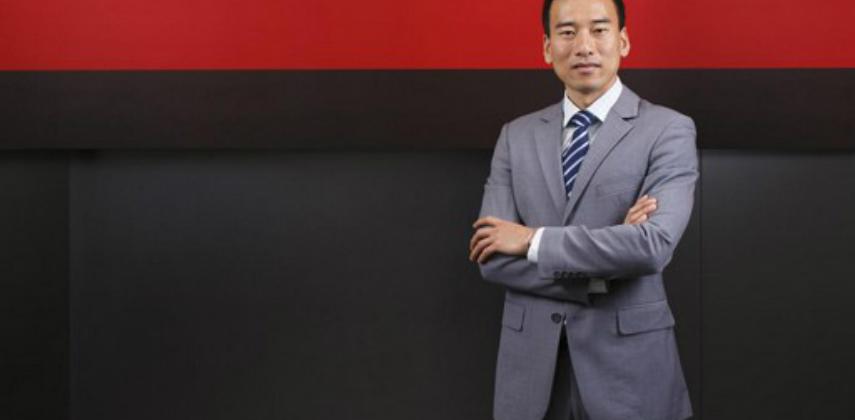Iron self-discipline saw Gavin Gui turn construction supplies company Hilti into a tower of strength
From his office window in Kwun Tong, Gavin Gui, general manager of Hilti (Hong Kong), a leading supplier to the building and construction trade, has a bird’s eye view of the cruise terminal that is being built on the site of Hong Kong’s former Kai Tak airport, and which is scheduled for completion this year.
The terminal has been a major source of business for Hilti, and will bring many changes to this industrial area, but perhaps not as many as Gui has brought to Hilti.
In the 18 months or so since he took over as general manager, the company’s Hong Kong business results have seen annual growth of 20 per cent, and a 50 per cent rise in cordless tool sales year-on-year.
He says Hilti’s success is due to a strong brand and a highly aligned business structure with a clear focus on growth and excellence, though he readily concedes that timing has also played a part in the upswing in figures. “Today’s markets are in our favour, thanks to government investment in large infrastructure projects,” he says.
The company’s emphasis on putting people first struck a chord with Gui, and his approach since arriving at Hilti has been to focus on people in a very direct way.
“I called them one by one to my office, and had lunch with different teams,” he says of his first days in the job. “To learn the business, you need to learn the people.”
He also spends an hour a week coaching a member of staff in a one-on-one discussion session, focusing on their career paths, teamwork, or other subjects they choose.
In April this year, Hilti was named a Best Employer by Aon Hewitt. The award will go some way to helping Gui achieve one of his goals – demonstrating that a company in a traditional industry like construction can be an employer of choice.
Ultimately, Gui wants Hilti Hong Kong to be at the forefront of talent development on a regional, and possibly international, basis.
To keep the team aligned to the company’s strategic vision, and maintain high standards, Gui practises internal communication on a level that is often a subject of theory but is rarely seen in practice.
Weekly execution meetings take place every Monday morning in his office, a light-filled space where a meeting table is conspicuous by its absence.
A couple of small, circular glass tables, just big enough for a few coffee cups, set the tone for short, direct reporting-oriented meetings lasting a maximum of an hour.
Gui, who usually works standing up, likes to keep things simple and direct. Each team leader speaks for 15 minutes on the top three tasks of the previous week and their progress, plus the top three of the current week. He borrowed the format from earlier roles. “It’s very powerful, I would say.”
Powerful is also a fitting description of Gui’s strength of focus and his ability to assimilate tough lessons.
He decided a decade ago that a career as a general manager would suit his personality and talents.
In pursuit of his goal, he found himself heatedly arguing his corner with other managers when differences of opinion or strategy arose.
But it was not getting him the results he wanted, and he finally realised that he was taking things too personally. Emotional detachment, he said, is essential in business.
“When you have problems, you need to be less emotionally attached, and think coolly,” he says. “You have to understand that business has cycles. It’s about how you impact them.”
By 2006, he had achieved his aim, becoming general manager at Schneider Electric’s power and buildings business units on the mainland.
Then he met colleagues who introduced him to the concept of resilience, which he defines as “the individual ability to build a healthy body, engage and align emotions, mind and spirit” which allows one to bounce back in times of adversity and reach one’s potential.
Keeping himself balanced and focused is essential to achieving success, he believes.
Gui says he maintains a strict regime based on consistency. Mornings, for example, start at 6am with yoga practice. Habits like these have impacted his whole life in a positive way, he says.
“It’s very energetic, healthy, but also emotionally and spiritually rich,” he says.
When it comes to dealing with others, Gui learned another valuable lesson from a former boss, who was located in Boston, making communication between the two unavoidably irregular. Nonetheless, his boss delegated to him with complete trust and the level of that trust, along with the ensuing sense of empowerment, left Gui astounded.
“He showed me the power of building trust,” says Gui. “Particularly when you manage a multicultural, multinational team, it’s very important.”
Gui practices delegating in his own team in a straightforward way. Recently, for example, he gave the job of organising the logistical end of the company’s expansion to his staff to encourage their sense of entrepreneurship and increase their job satisfaction. It fits with his belief that the entire company must be involved in the firm’s growth rather than just one person.
Gui says his strongest points are a very clear sense of direction, both as an individual and as a leader, plus persistence and self-discipline. “If I believe it’s the right thing to do, I really go to the end,” he says.
GUI’S GUIDE
Some tips on leadership from Gavin Gui
RESILIENCE “The individual ability to build a healthy body, engage and align emotions, mind and spirit.”
TRUST “Everything starts or ends with trust... When you manage a multicultural, multinational team, it’s very important”
COACHING “The most powerful skill for a leader.” (Gui spends an hour a week coaching a staff member one-on-one.)
DIVERSITY “The accelerator of innovation and high performance.”
PEOPLE “To learn the business, you need to learn the people.”


